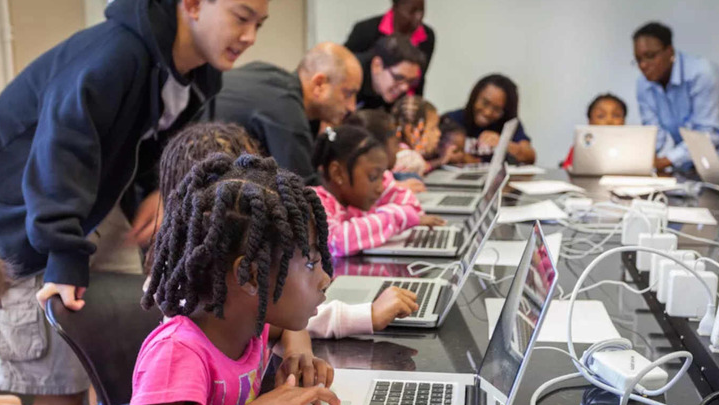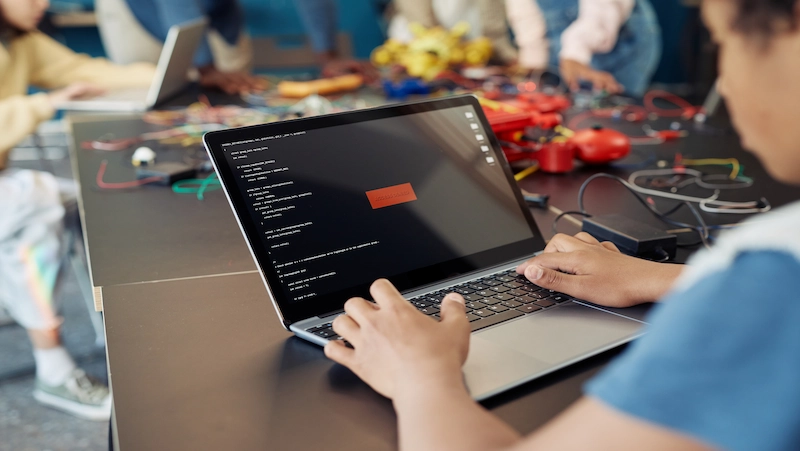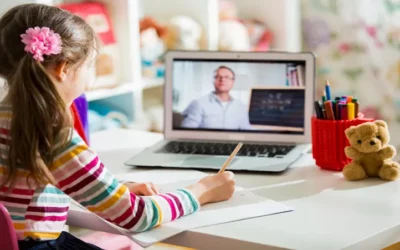In today’s rapidly evolving digital world, coding has become an essential skill that opens up a world of possibilities for young minds. By introducing your child to coding education, you can empower them to unlock their full potential and thrive in an increasingly technology-driven society. In this article, we will explore the incredible benefits of coding education for children and how it can help shape their future success.
Introduction to Coding School for Kids
Unlocking Your Child’s Potential with Coding Education explores the profound impact that coding can have on a child’s intellectual development, problem-solving abilities, and creativity.
By introducing children to coding at an early age, we provide them with a solid foundation in computational thinking and equip them with the skills necessary to thrive in the digital age.

This comprehensive guide delves into the numerous benefits of coding education for children. From fostering critical thinking and logical reasoning to promoting teamwork and collaboration, coding transcends mere programming knowledge and becomes a catalyst for holistic development.
Through engaging projects, interactive activities, and real-world applications, children not only learn the language of computers but also develop essential life skills that will serve them well in any field they choose to pursue.
Moreover, coding education promotes innovation and entrepreneurship, encouraging children to think outside the box and become creators rather than passive consumers of technology.
By nurturing their problem-solving abilities, resilience, and adaptability, coding empowers children to approach challenges with confidence and find innovative solutions. Whether they dream of designing video games, building robots, or creating groundbreaking applications, coding opens doors to a world of endless opportunities.
As parents and educators, it is our responsibility to prepare our children for the future. By investing in their coding education, we equip them with a powerful tool that empowers them to navigate a technology-driven world with confidence and creativity.
Join us on this journey to unlock your child’s potential with coding education, and witness the transformative impact it can have on their lives. Together, let’s nurture a generation of young minds ready to shape the future.
Table of contents
- Introduction to Coding School for Kids
- Benefits of Coding School for Kids
- Choosing the Right Coding School for Your Child
- Tips for researching and evaluating different coding schools
- Popular Coding Schools for Kids
- How to Support Your Child’s Learning at a Coding School
- Conclusion
- Frequently Asked Questions
Benefits of Coding School for Kids
In this digital era, coding has become an indispensable skill that holds the key to the future. Recognizing the importance of coding literacy, many parents are opting to enroll their children in coding schools.
These specialized educational institutions, including coding websites for kids, offer a unique learning environment tailored specifically to young minds, providing a multitude of benefits that extend far beyond the realm of programming. In this blog post, we will delve into the advantages of attending a coding school for kids and how it can empower them to thrive in a technology-driven world.

Nurturing Problem-Solving Skills
Coding is simply the practice of problem-solving through computation and reasoning. Children that attend coding schools are better able to divide complicated problems into smaller, more manageable pieces. Kids gain analytical and critical thinking abilities through practical projects and coding difficulties.
They get the ability to approach issues from several perspectives, including coding for kids, which promotes creativity and innovation. Beyond the world of programming, these problem-solving abilities developed through coding become useful assets in many facets of life.
Enhancing Mathematical and Logical Reasoning
The concepts used in coding have their roots in logic and mathematics. Young children who learn to code develop a stronger knowledge of mathematical ideas like algorithms, patterns, and geometry.
As kids build instructions, conditional statements, and loops, they learn logical reasoning. These abilities strengthen their mathematical performance as well as their capacity for logical and methodical thought, laying a solid basis for their future academic endeavors.
Fostering Collaboration and Teamwork
The collaborative learning environment offered by coding schools promotes cooperation and teamwork. Students frequently participate in group projects where they collaborate to solve problems and share ideas.
Children learn how to cooperate to accomplish a common goal through collaborative coding, which promotes good communication. These encounters build the foundation for effective teamwork, a crucial ability in both business and daily life. Engaging in fun activities for kids like building a giant puzzle together fosters collaboration and teamwork among young minds.
Boosting Confidence and Resilience
Coding can be difficult, but conquering challenges and finishing tasks effectively gives one a sense of satisfaction and increases confidence. Children acquire the skills of perseverance, iteration, and problem-solving.
They learn that failure is a step on the road to success from the iterative nature of coding. Children are equipped to accept challenges, approach complex problems with confidence, and develop a growth mentality because of the resilience that coding fosters.
Fostering Creativity and Digital Literacy
Children can use coding as a creative outlet to realize their ideas. It inspires people to think creatively and come up with original ideas. Children may let their imaginations run wild and create interactive experiences because of the way that storytelling, game design, and animation are frequently incorporated into coding education.
Additionally, coding instruction gives children the digital literacy skills they need to use the internet safely and ethically.
Opening Doors to Future Opportunities
Coding talents are widely sought after by companies across industries in today’s technology-driven culture. Children that start attending coding schools at a young age will have an advantage in learning these in-demand skills.
It gives them a solid foundation in problem-solving, logical thinking, and coding languages, positioning them for interesting job prospects in the future. As kids may turn their ideas into reality by creating their own apps or websites, coding literacy also provides avenues to entrepreneurial endeavors.
Choosing the Right Coding School for Your Child
As a parent, you recognize the importance of providing your child with a solid foundation in coding and teaching kids responsibility. However, with numerous coding schools available, choosing the right one can be a daunting task.
To help you make an informed decision, we have compiled a list of factors to consider when selecting a coding school for your child.
From location and curriculum to class size and cost, these considerations will play a vital role in ensuring a positive learning experience.

Location
The location of the coding school is an important factor to consider. Assess the convenience and accessibility of the school in relation to your home or your child’s daily routine.
Opting for a school that is close to home can minimize travel time and make it easier for your child to attend classes regularly.
Additionally, a nearby school might foster a sense of community, allowing your child to interact with other aspiring young coders in the local area.
Curriculum
Evaluate the curriculum offered by the coding school to understand what is coding for kids. Look for a program that provides a comprehensive and age-appropriate curriculum. A well-structured curriculum should introduce coding concepts gradually, ensuring that your child can grasp foundational skills before moving on to more advanced topics.
It should also include hands-on projects and practical applications to reinforce learning. Consider whether the school covers multiple programming languages, as exposure to different languages can broaden your child’s skill set.
Class Size
The student-to-teacher ratio and class size are crucial aspects to consider when selecting a coding school. Smaller class sizes allow for more personalized attention from instructors, enabling them to address individual learning needs effectively.
A smaller group setting can also foster collaboration and encourage teamwork among students. Alternatively, some children thrive in larger classes where they can interact with a diverse group of peers and engage in group projects. Consider your child’s learning style and preferences when assessing class size.
Teaching Methodology
Gain insight into the teaching methodology employed by the coding school. Effective coding education often involves a blend of theoretical instruction and hands-on practice. Look for a school that incorporates interactive and project-based learning, as this approach encourages creativity and problem-solving skills.
Additionally, check if the school promotes critical thinking and logical reasoning, which are essential for mastering coding concepts.
Cost and Value
Cost is an important factor when choosing a coding school, but it should not be the sole determining factor. Compare the tuition fees of different schools and evaluate the value they provide in return.
Consider factors such as the expertise of the instructors, the quality of resources and facilities, and the track record of the school in producing successful coders. Remember that investing in your child’s education is a long-term investment, and choosing a school solely based on cost might compromise the quality of education provided.
Tips for researching and evaluating different coding schools
When it comes to choosing the right coding school, thorough research and evaluation are essential to ensure you make an informed decision. With numerous options available, it’s important to consider certain factors that can significantly impact your learning experience and career prospects. To help you with this process, here are some valuable tips to consider:

Define your goals
Clearly outline your objectives and expectations from a coding school, whether your child is interested in coding, reading for kids, or art for kids. Are you looking for a comprehensive program or a specific specialization? Understanding your goals will help you narrow down your options and find a school that aligns with your aspirations.
Accreditation and reputation
Look for coding schools that are accredited or recognized by reputable institutions or industry organizations. Accreditation ensures that the school meets certain quality standards. Additionally, consider the school’s reputation within the tech industry and check reviews or testimonials from current and past students
Curriculum and teaching methods
Assess the coding school’s curriculum to determine if it covers the relevant programming languages, tools, and technologies you wish to learn. A good coding school should offer a well-rounded and up-to-date curriculum that meets industry demands. Furthermore, inquire about their teaching methods, such as hands-on projects, real-world applications, and access to industry professionals.
Faculty and mentors
Learn about the instructors and mentors who will be guiding your learning journey, whether it’s in coding classes for kids or reading for kids. Experienced and knowledgeable faculty can greatly enhance your learning experience. Look for coding schools that provide information about their instructors’ backgrounds, expertise, and industry experience.
Alumni Success and career support
Research the career outcomes of past graduates. Did they find jobs in the field? What kind of companies or positions did they secure? A coding school with a track record of successful alumni indicates a strong program. Additionally, inquire about the career support services offered, such as job placement assistance, networking opportunities, and internship programs.
Flexibility and learning format
Consider your preferred learning style and the flexibility offered by the coding school. Some schools offer in-person classes, while others provide online or hybrid options. Evaluate whether the school’s format and schedule align with your lifestyle and commitments.
Financial Considerations
Coding schools can vary widely in terms of cost. Evaluate the tuition fees, payment options, scholarships, and financing options available. It’s important to consider the return on investment and weigh the cost against the potential career opportunities and salary prospects.
Popular Coding Schools for Kids
Coding has developed into a crucial talent in the modern digital world that gives kids the ability to solve problems and develop their creativity. Enrolling your child in a coding school can be a great way to get them started on their adventure, whether they have dreams of making their own video game, designing a website, or developing cutting-edge software.
In order to assist you in making an informed choice and give your child the greatest learning experience possible, this article covers a selection of well-known coding schools for kids that offer both online and in-person choices.

BrightCHAMPS
CodeChamps by BrightChamps is an extraordinary platform that ignites young minds with the power of coding. It is a creative wonderland where kids dive into the captivating world of programming, learning to unravel complex algorithms and craft their own digital masterpieces.
With a holistic curriculum, CodeChamps nurtures the innate problem-solving abilities of children, fostering their creativity and critical thinking. CodeChamps is where dreams come alive, and the future of innovation takes flight.
Code.org
Code.org is a nonprofit organization that offers a range of coding courses suitable for kids of all ages. With its mission to make computer science and computer games for kids access to all, Code.org provides free online courses, tutorials, and coding challenges. Their curriculum is designed to engage students through interactive games and puzzles, ensuring a fun and enjoyable learning experience.
Khan Academy
Khan Academy is renowned for its vast collection of educational resources, and coding is no exception. They offer a comprehensive coding curriculum for kids that covers the basics of programming languages like JavaScript and HTML. Khan Academy’s interactive platform allows children to learn at their own pace, and it also provides opportunities to collaborate with other students through coding projects.
Scratch
Developed by the Massachusetts Institute of Technology (MIT), Scratch is a visual programming language designed specifically for kids aged 8 and above. Scratch enables children to create interactive stories, animations, and games by dragging and dropping code blocks. It encourages creativity, problem-solving, and logical thinking, making it an ideal choice for beginners.
Tynker
Tynker offers a range of coding courses for kids, starting from basic programming concepts, and programming for kids and gradually progressing to more advanced topics. Their platform uses a block-based coding interface, making it easy for children to understand and apply coding principles. Tynker also provides a variety of engaging projects, such as creating Minecraft mods and designing mobile apps, to keep young learners motivated.
Codemoji
Codemoji combines coding education with emoji-based learning, making it a unique and engaging platform for kids. With a focus on web development and programming languages like HTML, CSS, and JavaScript, Codemoji offers interactive lessons, quizzes, and challenges to help children grasp coding concepts. Their curriculum is designed to build real-world coding skills while keeping the learning process enjoyable.
Coding Dojo
For older kids and teenagers looking to delve deeper into coding, Coding Dojo offers boot camps and in-person coding programs. With locations across the United States, Coding Dojo provides intensive training in various programming languages, including Python, Java, and more. They emphasize project-based learning and mentorship, ensuring students gain practical experience and develop a strong foundation in coding.
iD Tech
iD Tech offers both online and in-person coding camps for kids and teenagers. With a wide range of courses, including game development, coding for AI, robotics, and more, iD Tech provides hands-on experiences to nurture young minds. Their instructors are industry professionals, and the camps are held on prestigious university campuses, giving students a taste of a collegiate environment.
Click here to learn about robotics projects for kids
How to Support Your Child’s Learning at a Coding School
Coding schools have gained popularity as effective educational institutions that nurture young minds and equip them with valuable coding skills. As a parent, you play a vital role in supporting your child’s learning journey at a coding school.
By staying involved, providing a conducive study space at home, and fostering a growth mindset, you can empower your child to thrive in their coding education. In this blog post, we will explore some essential tips for parents on how to effectively support their child’s learning at a coding school.

Stay involved in their coding journey
Staying involved and demonstrating a sincere interest in your child’s coding education is one of the most important things you can do to assist their education. Here is how to go about it:
a. Communicate with their coding instructors: Regularly communicate with your child’s coding instructors to stay updated on their progress, strengths, and areas that need improvement. This will enable you to comprehend their learning process and spot areas in need of more assistance.
b. Participate in parent-teacher conferences: Attending parent-teacher conferences or meetings can give you useful information about the coding curriculum, learning goals, and general performance of your child in their coding classes for kids. It’s a wonderful chance to raise issues, ask questions, and work with the coding school to improve your child’s educational experience.
Make a calm study area at home
A comfortable study space is necessary for concentrated learning. Here are some ideas for designing the perfect study place for your kid:
a. Choose a dedicated space: Choose a place in your home where your youngster may work on projects and assignments related to coding without being distracted. Make sure it has a desk, a chair, and the essential coding tools, and that it is well-lit and cozy.
b. Minimise distractions: Prevent disturbances like television, loud music, and excessive foot traffic in the study environment. To create a concentrated environment during study time, think about establishing restrictions for using technological devices.
Encourage a growth perspective
Because learning to code might be difficult at times, it’s important to help your youngster develop a growth mindset. Here are some tips for fostering a growth mindset:
a. Place an emphasis on effort and resiliency: Encourage your youngster to welcome difficulties and see them as chances for development. Stress the value of persistence, problem-solving, and taking responsibility for mistakes. You encourage them to adopt a resilient mindset by emphasizing effort over merely successful outcomes.
b. Honor successes and advancements: Acknowledge and honor all of your child’s coding accomplishments. Reward them for their effort, commitment, and advancement since this boosts their self-esteem and encourages them to keep studying.
c. Offer constructive criticism: When evaluating your child’s coding assignments, be sure to offer constructive criticism. Concentrate on the precise areas where they can improve.
For better understanding about free coding games for kids. Click here!
Conclusion
In conclusion, enrolling in a coding school and coding websites for kids offers children a wide range of valuable skills and knowledge that can benefit them in numerous ways. Throughout their coding journey, kids can expect to learn the fundamental concepts of computer for kids, computer programming, problem-solving techniques, and critical thinking skills.
Beyond technical expertise, coding schools provide a supportive and nurturing environment for children to explore their creativity and develop their unique ideas. Students will learn how to break down complex problems into smaller, manageable components, enabling them to tackle challenges systematically.
Coding schools open up a world of possibilities for children, empowering them to become active creators, innovators, and contributors in an increasingly digital and technology-driven society.
Frequently Asked Questions
A1: Coding is the process of creating computer programs using programming languages. It is important for children to learn to code as it enhances problem-solving skills, logical thinking, and creativity, and prepares them for future careers in technology.
A2: Enrolling your child in a coding school provides structured learning, access to experienced instructors, hands-on projects, and a supportive learning environment. It promotes critical thinking, and collaboration, and equips children with valuable coding skills.
A3: When choosing a coding school for your child, consider factors such as the curriculum, teaching methods, instructor qualifications, student reviews, class size, available resources, and the school’s reputation in the coding education community.
A4: Children can start learning to code as early as 5-7 years old. Some good beginner resources include coding apps, online coding classes for kids platforms with kid-friendly interfaces, coding books designed for young learners, and coding toys.
A5: Scratch, Blockly, and Python coding for kids are popular programming languages for kids to start learning. These languages have visual interfaces, and simplified syntax, and provide a foundation for logical thinking and problem-solving.
A6: In a coding school, children can expect to work on activities and projects such as creating interactive games, designing websites, building robots, developing mobile apps, and exploring virtual reality or augmented reality experiences.
A7: Yes, coding schools welcome children with no prior coding experience. Teachers provide introductory lessons, personalized attention, and scaffolded learning to ensure that every child understands the concepts and progresses at their own pace.
A8: The cost of enrolling a child in a coding school varies depending on the program, location, and duration. Some coding schools offer scholarships, financial aid, or discounts, so it’s worth inquiring about available options.


 We are an army of educators and passionate learners from BrightChamps family, committed to providing free learning resources to kids, parents & students.
We are an army of educators and passionate learners from BrightChamps family, committed to providing free learning resources to kids, parents & students.








